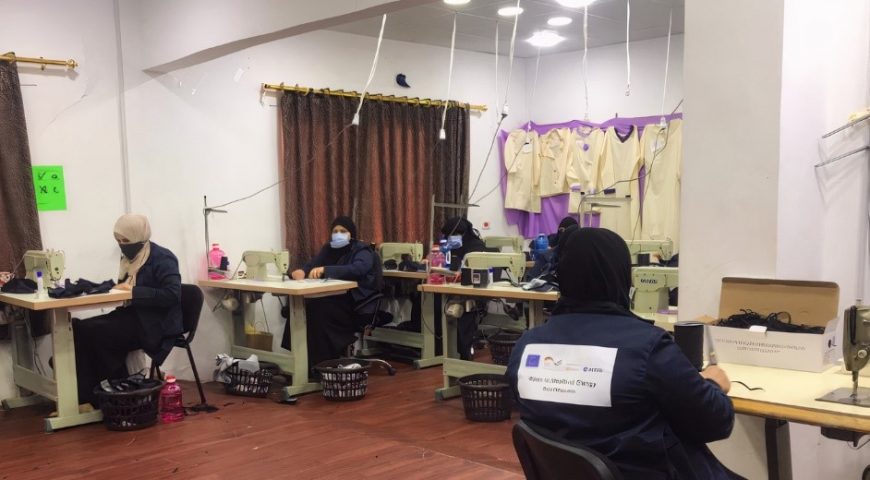The COVID-19 pandemic has left many unemployed More than half of the Jordanian and Syrians who were employed before the crisis indicated to have lost their entire income (UNDP assessment).
The poverty rate in Jordan increased from 21.7% before the COVID-19 pandemic to about 26.2% after the pandemic. Women's unemployment in particular has been deeply affected.
Another consequence of COVID-19 was the increased use of facemasks to mitigate the virus from spreading. The majority of the masks used were disposable which became a major source of littering. Use of reusable masks instead, can therefore contribute to reducing the frequency of littering and its ecological impact.
With financial support from GIZ, ACTED provided a 3-month work opportunity to produce reusable masks for 36 Jordanian and Syrian women in Irbid governorate in 2021. The project aimed to tackle both the women’s unemployment rate as well as the ecological impact of disposable masks.
Women are the first ones to feel the consequences of COVID-19 in Jordan
Women’s unemployment rates in Jordan raised sharply from 27% in 2019 to 32.8% by the end of 2020. ACTED has been providing job opportunities for women to improve their living conditions, livelihoods and empowerment
This not only created financial stress for women struggling to meet everyday expenses, but also increased women’s isolation and vulnerability. All of which had an impact on their mental health and the increased risk of domestic disputes.
To mitigate the economic impact and mental strain resulting from COVID-19, ACTED Jordan provided short-term employment opportunities to 36 vulnerable Jordanian and Syrian women with sewing and tailoring skills, including two women with disabilities

Like many women, Raghda, Manal and Dalida faced job insecurity and vulnerabilities due to the global pandemic. With the help of ACTED, they were able to access temporary work placement, as well as improve their skills to later have more chances to obtain sustainable employment opportunities. “This working experience allowed me to develop my tailoring, teamwork and production line skills” said Dalida.
Providing work opportunities to reach financial stability and sustainable employment for women
One of the main added-values of this intervention was the addition technical trainings for the hired female workers to complement their hands-on experience.
This experience enhanced my skills in team and workshop management, task assignment, team communication and plan setting for different stages within the production line
After the project, Raghda was hired as a tailor supervisor within a local community organization to provide trainings and oversee production activities. 100% of the women hired by ACTED increased their earnings and 67% crossed the poverty line.
Manal used the money she earned during the temporary work placement to purchase her own sewing machine, which she will use to design, produce and sell clothing at affordable prices within her community. This job opportunity also allowed both Raghda and Dalida to close debts, pay rent and cover school fees for their daughters.